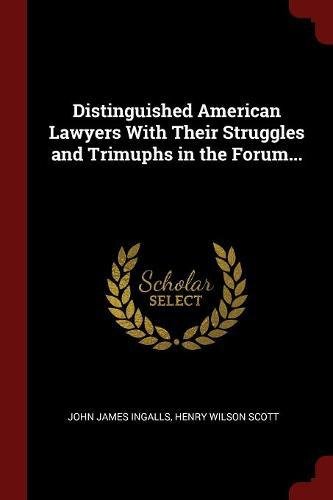Background
John James Ingalls was born on December 29, 1833, in Middleton, Massachusetts, to Elias T. and Eliza Chase Ingalls. Part of his childhood was spent in Haverhill.



( This work has been selected by scholars as being cultur...)
This work has been selected by scholars as being culturally important, and is part of the knowledge base of civilization as we know it. This work was reproduced from the original artifact, and remains as true to the original work as possible. Therefore, you will see the original copyright references, library stamps (as most of these works have been housed in our most important libraries around the world), and other notations in the work. This work is in the public domain in the United States of America, and possibly other nations. Within the United States, you may freely copy and distribute this work, as no entity (individual or corporate) has a copyright on the body of the work. As a reproduction of a historical artifact, this work may contain missing or blurred pages, poor pictures, errant marks, etc. Scholars believe, and we concur, that this work is important enough to be preserved, reproduced, and made generally available to the public. We appreciate your support of the preservation process, and thank you for being an important part of keeping this knowledge alive and relevant.
http://www.amazon.com/gp/product/1375878565/?tag=2022091-20
John James Ingalls was born on December 29, 1833, in Middleton, Massachusetts, to Elias T. and Eliza Chase Ingalls. Part of his childhood was spent in Haverhill.
John Ingalls attended local schools and, in 1855, graduated from Williams College in Williamstown, Massachusetts.
He returned to Haverhill to read law in the office of John J. Marsh and was admitted to the Essex County Bar in Newbury, Massachusetts, in 1857. He decided to leave Massachusetts for Kansas Territory soon after his admittance to the bar. He helped found the town of Sumner in the new territory in 1858. In 1860 he was secretary of the territorial council and was also secretary of the first state senate, in 1861. The next year he was elected state senator from Atchison county. In that year, and again in 1864, he was nominated for lieutenant-governor on the anti-Lane ticket. During the Civil war he served as judge advocate on the staff of Gen. George W. Deitzler with the rank of lieutenant-colonel.
His service in the United States Senate began in1873. His legislative interests included opposition to women’s suffrage and support of Negro civil rights. He opposed the tactics of the banking conglomerates and railroads.
His speeches and writings document his sometimes changing beliefs and views very clearly. He was in great demand as a speaker and served as eulogist at the funerals of many members of Congress. He also served as President protempore of the Senate.
He was a well known Senator and he found his work in Washington so stimulating that he admitted missing political life after leaving office in 1891.
His health deteriorated after that and he spent time traveling through the southwestern United States in an effort to improve it. His physical deterioration continued, however, and he died on August 16, 1900, in Las Vegas, New Mexico.
John Ingalls was a famous statesman. He succeeded in many things besides politics. These included the military, law, literature, banking, real estate, the newspaper business, prospecting, public speaking. He gained national renown for his essays on "Blue Grass" and the "Cat Fish Aristocracy".
In January, 1905, John Ingalls was honored with a marble statue in National Statuary Hall in the U. S. Capitol.
( This work has been selected by scholars as being cultur...)
Quotations:
There is neither rank nor station nor prerogative in the republic of the grave.
In the democracy of the dead all men at last are equal. There is neither rank nor station nor prerogative in the republic of the grave.
In 1865 John Ingalls married Anna Louisa Chesebrough. Of this union eleven children were born.
